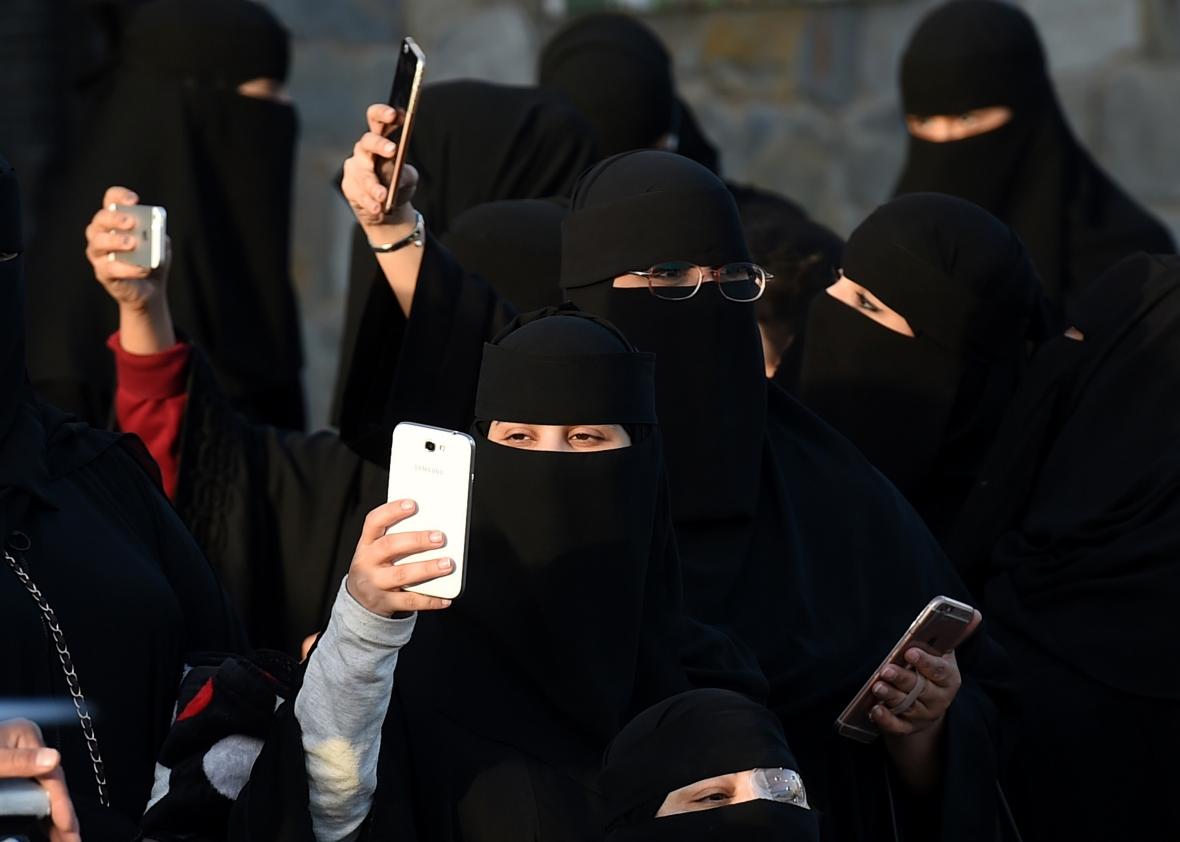Netizen Report: Protesters Set Fire to Modems in Saudi Telecom Boycott

Photo by FAYEZ NURELDINE/AFP/Getty Images
The Netizen Report offers an international snapshot of challenges, victories, and emerging trends in internet rights around the world. It originally appears each week on Global Voices Advocacy. Afef Abrougui, Ellery Roberts Biddle, Weiping Li, and Sarah Myers West contributed to this report.
When Saudi Arabians began a boycott of mobile providers Oct. 1, they planned for it to last a day. Nearly one month later, it is still going. Protesters are pressuring Saudi Telecom Company, the country’s state-owned provider, to lower service rates and push back against bans on select services offered by Viber, WhatsApp, Facebook Messenger, Telegram, and Skype. Protesters are refusing to use mobile networks, ceasing all text messaging and declining to add credit to their data packages.
While a handful say they are relying exclusively on broadband connections for communication, Global Voices’ sources in the country say that most people involved have switched to smaller service providers including local competitor Mobily and Kuwaiti telco Zain. The campaign has gained significant traction on Twitter and on YouTube, where several supporters have posted videos of people destroying modems (some with the Saudi Telecom logo clearly visible) and flushing SIM cards down the toilet.
Fadal Bou Al-Ainain, an economist interviewed by local outlet Arab News, says Saudi Telecom could lose more than $13 million if the boycott continues through the end of the month.
In other news from Saudi Arabia, social activist Mamdouh Alshammari, also known as Al Monsadah, was arrested by law enforcement authorities for allegedly publishing critical videos on Snapchat. The Arabic Network for Human Rights Information reports Saudi security officials have begun a campaign of arrests against social media critics over the past several days, including arresting one teenager and the activist Aboud Bad. It is anticipated that they will file charges against Al Monsadah for “disrupting the public order, the religious values or public morals, or any false accusations.”
LinkedOut? Russian court decides to block LinkedIn on privacy grounds
LinkedIn, the world’s largest online professional network, is at risk of being blocked in Russia, where federal censors have convinced a Moscow court to outlaw the network. A judge found that LinkedIn illegally shares nonusers’ personal data without their permission. The court also ruled that LinkedIn collects personal information from users in Russia without storing the data on servers located in Russia—a legal requirement introduced last year that few foreign internet companies respect.
Yandex takes independent news sources off its “top news” roster
The Russian search engine Yandex plans to stop featuring articles from news outlets that have not registered with the Russian government in its “top news” lists. Yandex is being forced to make the change in order to comply with a June 2016 law regulating online news aggregators with more than 1 million daily viewers. The changes are anticipated to take effect by January 2017.
Morocco lifts ban on VoIP apps, for now
Moroccan authorities have unexpectedly lifted a ban on VoIP applications that left subscribers unable to use voice-calling features of tools like WhatsApp and Skype since January 2016. As of Oct. 24, Moroccan users have been able to access these and other applications without using virtual private networks or other circumvention tools. Moroccans suspect that the change is temporary and believe it came in anticipation of the U.N. Climate Change Conference set to take place in the city of Marrakesh between Nov. 7–18.
Chinese police report calls virtual private networks “violent and terrorist software”
A police report leaked last week from China's Xinjiang province describes internet censorship circumvention tools as falling into a special category of “second class violent and terrorist software.” The report does not describe an actual crime taking place; rather, it anticipates that a crime might have taken place because the suspect attempted to access censored web content with a circumvention tool. There is no public information describing how or why certain technologies are classified as such, or what other products share this classification. For users in China—VPNs are relatively common in major cities and at private companies—the leak has raised major questions about the legalities of circumvention tools now and in the future.
New Research
- “The Economic Impact of Disruptions to Internet Connectivity”—Global Network Initiative
- “Comparative Analysis of Surveillance Laws and Practices in Latin America”—Katitza Rodriguez, Electronic Frontier Foundation
- “Report of the Special Rapporteur on the Promotion and Protection of the Right to Freedom of Opinion and Expression”—David Kaye, United Nations
- “Mapping and Quantifying Political Information Warfare”—Share Lab
Future Tense is a partnership of Slate, New America, and Arizona State University.

